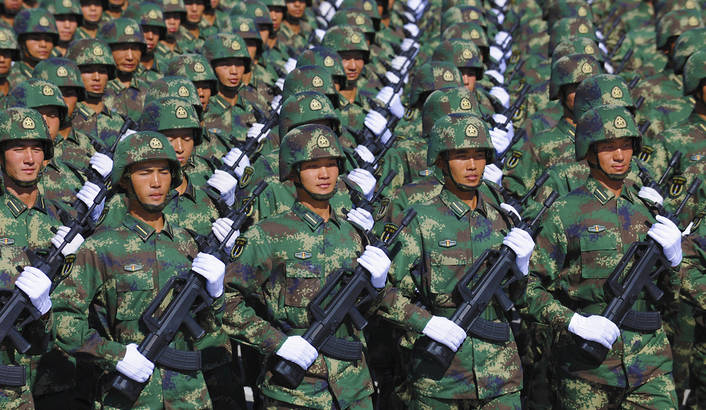
From Malcolm Moore, Telegraph: China will push through a double-digit rise in its defence spending again this year, a sign that its new leaders are currying favour with the military even as the economy slows.
Military spending will rise by 10.7 per cent to 720 billion yuan (£76.5 billion) this year. The figure is more than double the UK’s defence spending of around £34 billion, and more than triple the Indian figure of £25 billion.
By next year, China will also be spending three times as much on defence as Japan, with whom it is currently engaged in an increasingly acrimonious territorial standoff. . . .
China has raised its defence budget by double digits each year for most of the past two decades. Last year’s increase was 11.2 per cent.
But this year’s rise comes against a backdrop of slowing growth, with GDP forecast to rise by 7.5 per cent compared to an average of more than 10 per cent for most of the past decade.
Xi Jinping, the incoming Chinese president, appears to be courting the military by protecting the defence budget and has already made a series of high-profile visits to army, navy and air force bases in recent months. . . .
At the same time, China said it would spend even more money, 769 billion yuan, on its internal security, the police and armed police forces that "maintain stability."
From Ben Blanchard and John Ruwitch, Reuters: China unveiled another double-digit rise in military expenditure on Tuesday, but for a third year in a row the defense budget will be exceeded by spending on domestic security, highlighting Beijing’s concern about internal threats.
Spending on the People’s Liberation Army (PLA) will rise 10.7 percent to 740.6 billion yuan ($119 billion), while the domestic security budget will go up at a slightly slower pace, by 8.7 percent, to 769.1 billion yuan, according to the budget released at the opening of parliament’s annual meeting.
The numbers underscore the ruling Communist Party’s vigilance not only about territorial disputes with Japan and Southeast Asia and the U.S. "pivot" back to the region, but also about popular unrest over corruption, pollution and abuse of power, despite robust economic growth and rising incomes.
The number of "mass incidents" of unrest recorded by the Chinese government grew from 8,700 in 1993 to about 90,000 in 2010, according to several government-backed studies. Some estimates are higher, and the government has not released official data for recent years. (photo: Joe Chan/Reuters)
Image: reuters%203%205%2013%20PLA.jpg
